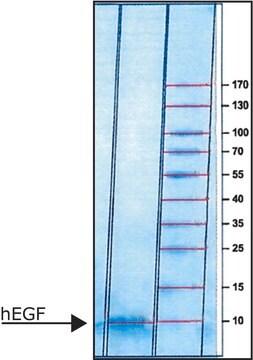GF323
IGF-II, Human Recombinant
Animal Free
Sinonimo/i:
Insulin-like Growth Factor-II
Autenticatiper visualizzare i prezzi riservati alla tua organizzazione & contrattuali
About This Item
Codice UNSPSC:
12352202
eCl@ss:
32160405
Prodotti consigliati
Categorie correlate
Descrizione generale
Product Source: Protein is expressed in E.coli.
The protein is manufactured without the use of any animal products/reagents and is considered Animal-Free and can be used in protocols where possible transmisson of animal viruses and contamination must be avoided.
The protein is manufactured without the use of any animal products/reagents and is considered Animal-Free and can be used in protocols where possible transmisson of animal viruses and contamination must be avoided.
The IGFs are mitogenic polypeptide growth factors that stimulate the proliferation and survival of various cell types including muscle, bone, and cartilage tissue in vitro. IGFs are predominantly produced by the liver, although a variety of tissues produce the IGFs at distinctive times. The IGFs belong to the Insulin gene family, which also contains insulin and relaxin. The IGFs are similar by structure and function to insulin, but have a much higher growth-promoting activity than insulin. IGF-II expression is influenced by placenta lactogen, while IGF-I expression is regulated by growth hormone. Both IGF-I and IGF-II signal through the tyrosine kinase type I receptor (IGF-IR), but, IGF-II can also signal through the IGFII/ Mannose-6-phosphate receptor. Mature IGFs are generated by proteolytic processing of inactive precursor proteins, which contain N-terminal and C-terminal propeptide regions.
Recombinant human IGF-I and IGF-II are globular proteins containing 70 and 67 amino acids, respectively, and 3 intra-molecular disulfide bonds.
Recombinant human IGF-I and IGF-II are globular proteins containing 70 and 67 amino acids, respectively, and 3 intra-molecular disulfide bonds.
Applicazioni
Research Category
Stem Cell Research
Stem Cell Research
Research Sub Category
Growth Factors & Receptors
Growth Factors & Receptors
Qualità
Determined by its ability to stimulate the proliferation of mouse FDC-P1 cells. The expected ED50 is ≤ 2.0 ng/ml, corresponding to a specific activity of ≥5 x 10^5 units/mg.
Stato fisico
Product is sterile filtered through a 0.2 micron filter. Lyophilized with no additives.
Stoccaggio e stabilità
Store at -20°C for up to 4 months from date of receipt Centrifuge the vial prior to opening.
Reconstitute in water to a concentration of 0.1-1.0 mg/ml. Do not vortex. For extended storage, it is recommended to further dilute in a buffer containing a carrier protein and store in working aliquots at -20°C.
Reconstitute in water to a concentration of 0.1-1.0 mg/ml. Do not vortex. For extended storage, it is recommended to further dilute in a buffer containing a carrier protein and store in working aliquots at -20°C.
Esclusione di responsabilità
Unless otherwise stated in our catalog or other company documentation accompanying the product(s), our products are intended for research use only and are not to be used for any other purpose, which includes but is not limited to, unauthorized commercial uses, in vitro diagnostic uses, ex vivo or in vivo therapeutic uses or any type of consumption or application to humans or animals.
Codice della classe di stoccaggio
11 - Combustible Solids
Classe di pericolosità dell'acqua (WGK)
WGK 1
Punto d’infiammabilità (°F)
Not applicable
Punto d’infiammabilità (°C)
Not applicable
Certificati d'analisi (COA)
Cerca il Certificati d'analisi (COA) digitando il numero di lotto/batch corrispondente. I numeri di lotto o di batch sono stampati sull'etichetta dei prodotti dopo la parola ‘Lotto’ o ‘Batch’.
Possiedi già questo prodotto?
I documenti relativi ai prodotti acquistati recentemente sono disponibili nell’Archivio dei documenti.
Il team dei nostri ricercatori vanta grande esperienza in tutte le aree della ricerca quali Life Science, scienza dei materiali, sintesi chimica, cromatografia, discipline analitiche, ecc..
Contatta l'Assistenza Tecnica.


